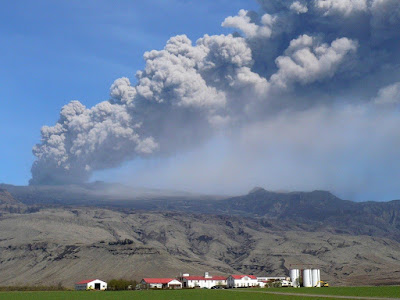 |
| Eruption column from the explosive phase of the Eyjafjallajokull eruption drifting over a farm – image by Bristol volcanologist Susanna Jenkins |
They are right of course, the Bristol volcanology group spends its time travelling all over the world to address volcanic risk in many countries, from the first to the third world. When one looks back on volcanic eruptions in recent history, especially the big, memorable ones like Mount St Helens, Eyjafjallajokull and Montserrat one realises that Bristol volcanologists were there at every stage.
There are, of course, many layers to handling a volcanic crisis. First there’s initial monitoring; will this volcano erupt at all? Often this involves going to volcanoes that have been little studied in remote places, or monitoring them from satellites: something which Bristol volcanology has taken in its stride, by trailblazing projects on understudied African volcanism.
 |
| InSAR image showing volcanic uplift in the Great Rift Valley as part of research by Bristol volcanologist Juliet Biggs |
Still there is no rest for our volcanologists. Afterwards there’s the post-eruption work: Working out what made the volcano erupt and understanding the physical processes surrounding an event. How does it fit into the wider setting? Are the volcanoes linked? These questions have been asked and answered by our volcanologists who have also reached out to form a global database with other institutions. This has resulted in more cohesion in the community, and a greater understanding of how volcanoes interact.
A wealth of different specialities have populated the group since it was started by Professor Steve Sparks including petrologists, geophysicists and geochemists. It is a result of this diverse environment that Bristol has been able to excel in so many areas. With natural hazards occurring on a near-daily basis, it’s safe to say the group has played its part in reducing the uncertainty of volcanic hazard across the globe. The Queen’s Anniversary Prize is an amazing recognition of the work that has been done over the years and a well-deserved reward for the hard work of the Bristol volcanologists.
——————————————————————–
This blog is written by Cabot Institute member Keri McNamara, a PhD student in the School of Earth Sciences at the University of Bristol.
